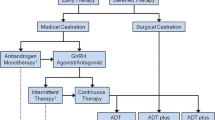Abstract
In 2005, it is estimated that more than 30,000 men will die from metastatic hormone-refractory prostate cancer. For decades, no chemotherapeutic agent demonstrated a survival benefit in these patients, although two randomized clinical trials demonstrated a clear palliative benefit using mitoxantrone combined with a corticosteroid. However, beginning in 1999, a series of phase-2 trials were performed using docetaxel, either as a single agent or in combination with estramustine. Preliminary data implied a survival improvement, with median survivals reported to be 14 to 23 months. Prostate-specific antigen levels dropped by more than 50% in 38% to 48% of patients treated with docetaxel. These findings were confirmed in two phase-3 randomized trials in which docetaxel with and without estramustine have demonstrated a survival benefit using chemotherapy in the treatment of hormone-refractory prostate cancer.
Similar content being viewed by others
References and Recommended Reading
Jemal A, Murray T, Ward E, et al.: Cancer Statistics 2005. Can J Clin 2005, 55:10–30.
Smaletz O, Scher HI, Small EJ, et al.: Nomogram for overall survival of patients with progressive metastatic prostate cancer after castration. J Clin Oncol 2002, 20:3972–3982.
Yagoda A, Petrylak D: Cytotoxic chemotherapy for advanced hormone-resistant prostate cancer. Cancer 1993, 3:1098–1099.
George D, Kantoff P: Prognostic indicators in hormone refractory prostate cancer. Urol Clin North Am 1999, 26:303–310.
Petrylak D, Scher H, Li Z, et al.: Prognostic factors for survival of patients with bidimensionally measurable metastatic hormone-refractory prostate cancer treated with single agent chemotherapy. Cancer 1992, 70:2870–2878.
D’Amico A, Saegaert T, Chen M, et al.: Initial decline in hemoglobin during neoadjuvant hormonal therapy predicts for early prostate-specific antigen failure following radiation and hormonal therapy for patients with intermediate and high-risk prostate cancer. Cancer 1992, 95:275–280.
Fazzari M, Heller G, Scher HI: The phase 2/3 transition: toward the proof of efficacy in cancer clinical trials. Control Clin Trials 2000, 21:360–368.
Scher HI, Eisenberger M, D’Amico A, et al.: Eligibility and outcomes reporting guidelines for clinical trials for patients in the state of a rising prostate-specific antigen: recommendations from the Prostate-Specific Antigen Working Group. J Clin Oncol 2004, 22:537–556.
Tannock I, Osoba D, Stockler M, et al.: Chemotherapy with mitoxantrone plus prednisone or prednisone alone for symptomatic hormone-resistant prostate cancer: a Canadian randomized trial with palliative end points. J Clin Oncol 1996, 14:1756–1764.
Kantoff P, Halabi S, Conaway M, et al.: Hydrocortisone with or without mitoxantrone in men with hormone-refractory prostate cancer: results of the Cancer and Leukemia Group B 9182 Study. J Clin Oncol 1999, 17:2506–2513.
Berry W, Dakhil S, Modiano M, et al.: Phase-3 study of mitoxantrone plus low dose prednisone versus low-dose prednisone alone in patients with asymptomatic hormone refractory prostate cancer. J Urol 2002, 168:2439–2443.
Stein C: Mechanisms of action of taxanes in prostate cancer. Semin Oncol 1999, 26:3–7.
Picus J, Schultz M: Docetaxel (Taxotere) as monotherapy in the treatment of hormone-refractory prostate cancer: preliminary results. Semin Oncol 1999, 26:14–18.
Friedland D, Cohen J, Miller R, et al.: A phase-II trial of docetaxel (Taxotere) in hormone-refractory prostate cancer: correlation of antitumor effect to phosphorylation of Bcl-2. Semin Oncol 1999, 26:19–23.
Berry W, Dakhil S, Gregurich M, et al.: Phase II trial of singleagent weekly docetaxel in hormone-refractory, symptomatic, metastatic carcinoma of the prostate. Semin Oncol 2001, 28:8–15.
Beer T, Pierce W, Lowe B: Phase II study of weekly docetaxel in symptomatic androgen-independent prostate cancer. Ann Oncol 2001, 12:1273–1279.
Gravis G, Bladou F, Salem N, et al.: Weekly administration of docetaxel for symptomatic metastatic hormone-refractory prostate carcinoma. Cancer 2003, 98:1627–1634.
Petrylak D, Shelton G, England-Owen C, et al.: Response and preliminary survival results of a phase II study of docetaxel + estramustine in patients with androgen-independent prostate cancer. Proceedings of the American Society of Clinical Oncology. New Orleans: May 20–23, 2000.
Petrylak D, Tangen C, Hussain M, et al.: Docetaxel and estramustine compared with mitoxantrone and prednisone for advanced refractory prostate cancer. N Engl J Med 2004, 351:1513–1520. This is the first of two phase-3 trials to have demonstrated a survival benefit using chemotherapy in the treatment of hormone-refractory prostate cancer.
Tannock I, De Wit R, Berry W, et al.: Docetaxel plus prednisone or mitoxantrone plus prednisone for advanced prostate cancer. N Engl J Med 2004, 351:1502–1512. This is the second paper describing a survival benefit using chemotherapy in the treatment of hormone-refractory prostate cancer.
Dahut W, Gulley J, Arlen P, et al.: Randomized phase-II trial of docetaxel plus thalidomide in androgen-independent prostate cancer. J Clin Oncol 2004, 22:2532–2539.
Beer T, Eilers K, Garzotto M, et al.: Weekly high-dose calcitriol and docetaxel in metastatic androgen-independent prostate cancer. J Clin Oncol 2003, 21:123–128.
Walczak J, Carducci M: Phase-3 randomized trial evaluating second-line hormonal therapy versus docetaxel-estramustine combination chemotherapy on progression-free survival in asymptomatic patients with a rising prostate-specific antigen level after hormonal therapy for prostate cancer: an Eastern Cooperative Oncology Group (E1899), Intergroup/Clinical Trials Support Unit Study. Urology 2003, 62(suppl 1):141–146.
Author information
Authors and Affiliations
Rights and permissions
About this article
Cite this article
Donohue, K.M., Petrylak, D.P. Chemotherapy agents and timing of chemotherapy in prostate cancer management. Curr Urol Rep 6, 224–227 (2005). https://doi.org/10.1007/s11934-005-0011-8
Issue Date:
DOI: https://doi.org/10.1007/s11934-005-0011-8




